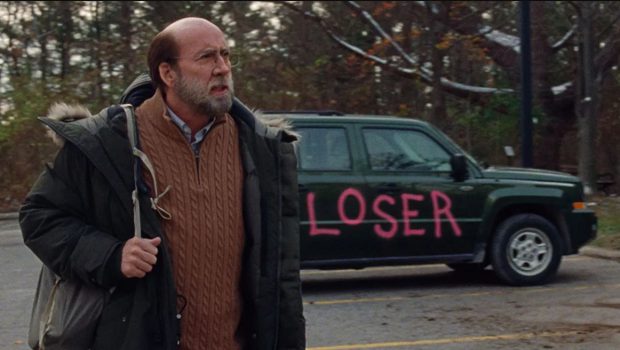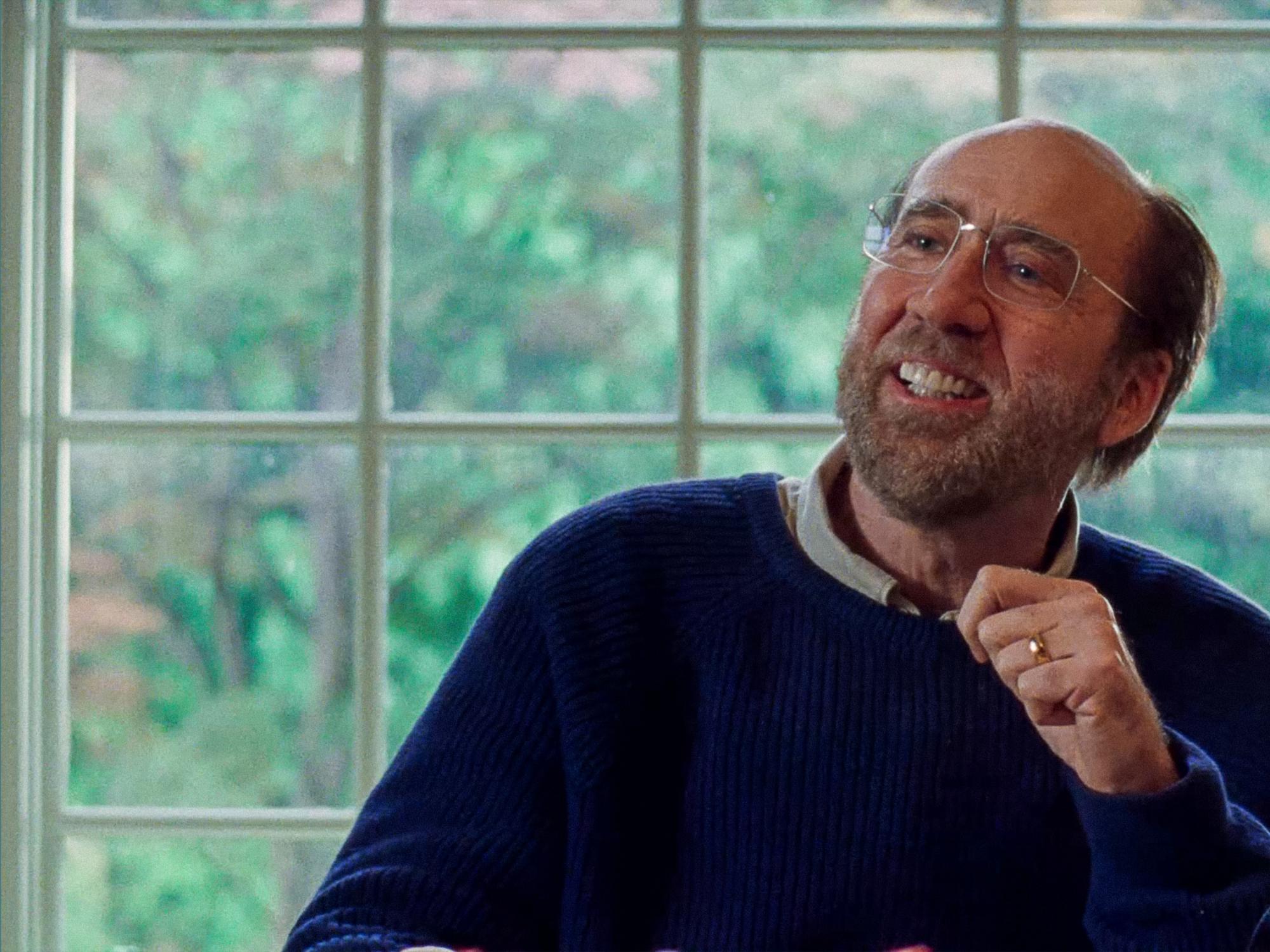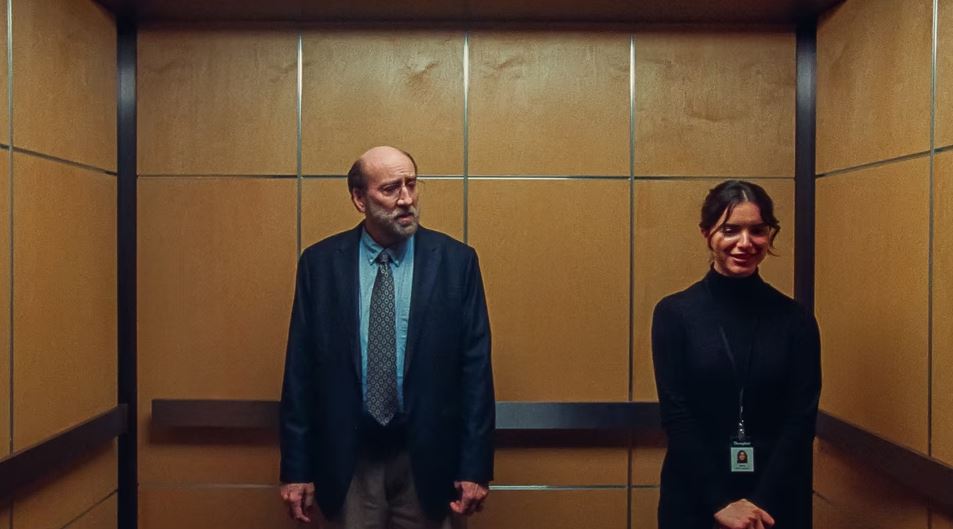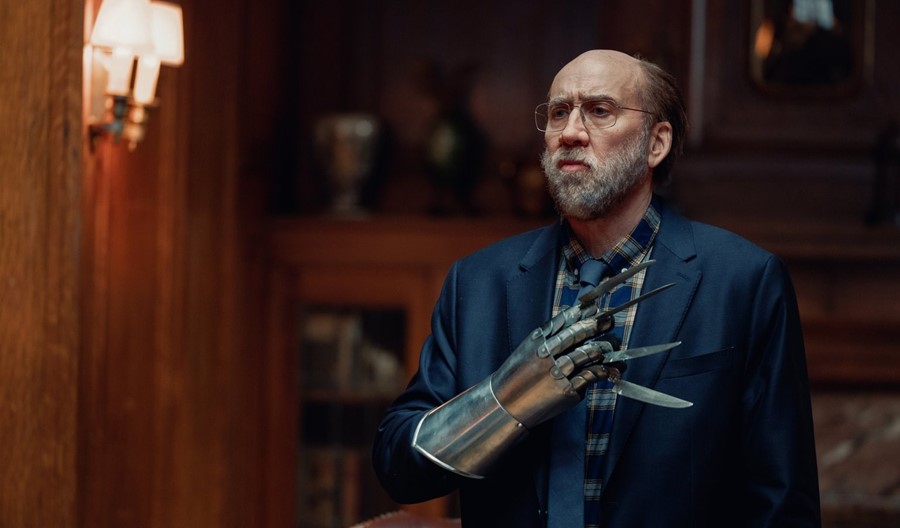Dream Scenario – Film Review
Reviewed by Damien Straker on the 31st of December 2023
Nixco presents a film by Kristoffer Borgli
Written by Kristoffer Borgli
Produced by Lars Knudsen, Ari Aster, Tyler Campellone, Jacob Jaffke, and Nicolas Cage
Starring Nicolas Cage, Julianne Nicholson, Dylan Gelula, Michael Cera, Tim Meadows, Dylan Baker, Jessica Clement, and Lily Bird
Cinematography Benjamin Loeb
Edited by Kristoffer Borgli
Music by Owen Pallett
Rating: MA15+
Running Time: 100 minutes
Release Date: the 1st of January 2024
It is good to see Nicolas Cage back on steady ground. He gave one of the best performances of his career in the psychological drama Pig (2021). Now he continues his good form with Dream Scenario. It is a unique and fascinating view of what happens when a person turns viral. There is a bit more to it than that, but one can see why the premise appealed to Cage. His own weird, manic acting style regularly circulates the internet through videos and memes. Furthermore, he enjoys playing bumbling underachievers. Dream’s self-depreciating mood recalls both Adaptation (2001) but also the film The Weather Man (2005). In the latter, he played a universally hated weather reporter who was struggling to hold his personal life together. The similarities between these films, including being a failed writer, are interesting. Dream is an American production (developed by A24 and produced by Ari Aster) but written and directed by Norwegian filmmaker Kristoffer Borgli. This is Borgli’s third feature after Drib (2017) and Sick of Myself (2022). Following Dream’s success, Borgli will receive a lot more attention for his talents. If the humorous, disturbing events of this film are clear that could be his own nightmare.
Dream is about Paul Matthews (Cage), a dreary biology professor who struggles to keep his students awake during his lectures. He and his wife, Janet (Julianne Nicholson), are also weary that one of his colleagues may have stolen his idea for a book on what he calls ‘antelligence’. Though when asked, Paul concedes he has not actually started his own writing. One day Paul is shocked to discover he has gone viral across the Internet because he is now appearing in the dreams of everyone around him. Random strangers recognise him, and his students are suddenly interested in talking to him. His daughters, Hannah (Jessica Clement) and Sophie (Lily Bird), want him to drive them to school. He is also excited about finally being invited to the dinner party of his colleague Brett (Tim Meadows). However, he and Janet receive a stark reality check when a stranger enters their house with a knife. It is one of several complications that accompanies being famous. Paul also meets with a talent agency headed by a fellow named Trent (Michael Cera). The agency is more interested in Paul promoting the drink Sprite rather than ants. During the meeting Paul also meets Molly (Unbreakable Kimmy Schmidt’s Dylan Gelula). She is an assistant who concedes she had a very bizarre, personal dream about him.
From the outset the film could be viewed as a simple parable about how fame builds people up before destroying them. Initially, Paul immediately relishes all the positive attention he receives. People are suddenly interested in what he has to say, and his ego is inflated. However, the dream aspect, which is thankfully never rationalised, adds another layer of depth to the themes. The film is about uncontrollable perceptions. One of the twists is that after Paul grows famous many people, including his own students, start having nightmares about him murdering them in increasingly violent ways. The students no longer feel safe around him. Paul also fights with a man in a café because the fellow wants him to leave and spits in his food. Later, a video circulates where Paul rants at some students. He is angry because someone has vandalised his car by tagging the word ‘loser’ on the side of it. The film veers from dreamscapes to resembling a satire of ‘cancel culture’. Every scenario gives a distorted view of Paul who is then increasingly ostracised from society. His inability to reverse these perceptions underlines a feeling of middle age powerlessness where he cannot influence the world in positive ways. The opening scene reflects this by showing one of his daughters falling from the sky. Some viewers will baulk at the negative view of cancel culture and how people are isolated by the movement. However, it is an exaggerated, satirical take and viewed through the lens of a European filmmaker. Notably, Paul is still welcome in France, which highlights how Europeans have a starkly different view of cancel culture to Western countries.
The director Kristoffer Borgli understands how to balance tonal shifts and effectively build scenes towards a punchline. Dream moves from being quietly humorous to disturbing and back again. Seeing a smiling picture of Nicolas Cage on screen before being named as an ongoing terror in people’s lives is incredibly funny. Yet there are moments that are shocking, such as when the intruder enters Paul’s house while brandishing a kitchen knife and then sneaks his bedroom. There is a slightly more grounded feel and look to the entire film that provides moments like this with more dramatic weight than expected. In one of the film’s best scenes Paul and the assistant Molly return to her apartment to try and reenact the dream that she had about him. The scene is so effectively written and staged because it leaves us in anticipation only to end on the most embarrassing note for Paul. It is fortunate that Cage is completely game for the multitude of obstacles and setbacks Paul faces. He knows how to play the hapless, goofball father well and even injects some pompousness into Paul as well. When he receives the pitch to promote Sprite, he angrily demands that the company takes more interest in his study of ants without the self-awareness to realise how unlikely this is. It is another rock-solid turn from the enigmatic actor who underlines how he can temper his self-deprecating work with shades of darkness too.
Dream Scenario is a striking blend of fantasy, humour, violence, and cultural satire. While it has a downward trajectory for its protagonist, it is never predictable about how it will end. Instead, it builds slowly on its clever premise to become increasingly funny and weird as it continually trips up its hapless and unlucky leading man. It has a lot to say about how middle-aged people feel incapable of creating change in the world, especially in the digital age where everything is recorded and can be distorted or blown out of proportion. Cage’s screen presence is a good reason why the film works effectively as both a comedy and a social drama. Equally, Kristoffer Borgli proves that he knows how to build scenes using tension and humour. One hopes that with all the good publicity he and his film are receiving that he will be able to handle his public profile a lot better than the sad sack Paul.
Summary: Dream Scenario is a striking blend of fantasy, humour, violence, and cultural satire.










